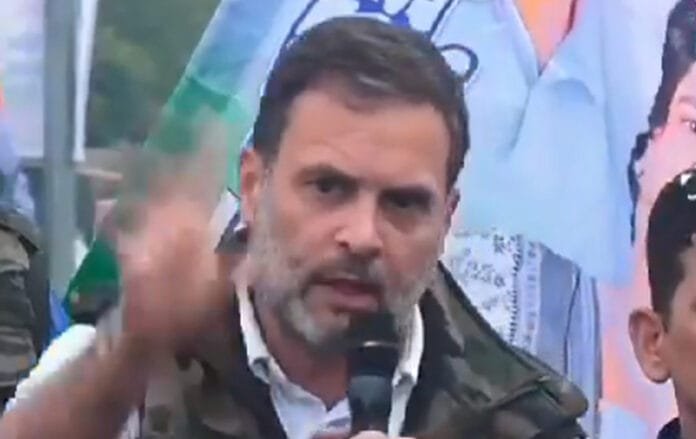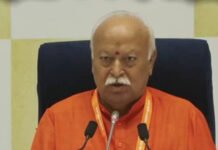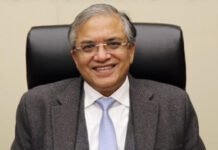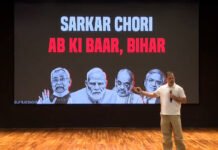An FIR has been filed against Congress leader Rahul Gandhi in Assam, accusing him of endangering the sovereignty of India. This legal action stems from remarks made by Gandhi during the inauguration of the Congress party’s new national headquarters in New Delhi. The case has sparked a political debate, with some defending Gandhi’s statement, while others view it as a calculated political move.
Background of the FIR Filed Against Rahul Gandhi
The FIR against Rahul Gandhi was lodged by lawyer Manjit Chetia on Saturday evening at the Panbazar Police Station in Assam. Chetia alleges that during his speech last week, Gandhi accused the Bharatiya Janata Party (BJP) and the Rashtriya Swayamsevak Sangh (RSS) of having “captured every institution” in the country. Gandhi further asserted that the opposition now finds itself fighting not just against the BJP and RSS, but also against the Indian state.
Chetia claims that this statement was made deliberately, with the intention of undermining the country’s sovereignty and integrity. The lawyer suggests that the comment aimed to incite rebellion against the democratically elected government of India.
The Legal Sections Involved in the Case
The FIR is registered under sections 152 and 197(1)(D) of the Indian Penal Code (IPC). Section 152 addresses acts that may jeopardize the sovereignty, unity, or integrity of India. On the other hand, Section 197(1)(D) deals with the dissemination of false or misleading information that could potentially endanger the nation’s sovereignty, unity, or integrity.
Legal experts argue that the charges could carry significant consequences if proven, especially considering the serious nature of the allegations involving national security and democratic stability.
Political Reactions and Defenses
The Congress party has swiftly labeled the filing of the FIR as a political stunt. Opposition Leader in the Assam Legislative Assembly, Debabrata Saikia, strongly criticized the legal action, claiming it was orchestrated by the BJP to intimidate and silence the opposition. According to Saikia, the BJP is using legal means to suppress critical voices within the political landscape.
Saikia defended Rahul Gandhi’s speech, pointing out instances when the Enforcement Directorate (ED) and the Central Bureau of Investigation (CBI) appeared to act in alignment with the BJP’s political agenda. He also claimed that the Election Commission had ceased providing data on voting patterns based on polling stations, suggesting a broader pattern of government interference.
A Divisive Political Statement
The statement by Rahul Gandhi, in which he criticized the BJP and RSS for allegedly taking control of key institutions, reflects deep concerns about the state of democracy in India. Critics argue that such comments, made in the presence of party supporters, could further polarize the political climate. Supporters of Gandhi, however, maintain that his remarks reflect a genuine concern for India’s democratic processes and the growing centralization of power.
At the heart of the controversy is the question of whether such statements, which challenge the functioning of democratic institutions, can be considered as threats to national security. Gandhi’s opponents, including members of the BJP, argue that such rhetoric could undermine the credibility of elected institutions and weaken public trust in the government.
The Larger Debate Over Free Speech and Accountability
This incident raises broader questions about the balance between free speech and national security concerns. While political leaders are entitled to express dissent and critique the government, there is an ongoing debate over where the line should be drawn between legitimate criticism and inflammatory speech that could destabilize the country.
Legal experts suggest that such cases are often challenging because they involve subjective interpretation of what constitutes a threat to national integrity. In this case, the interpretation of Rahul Gandhi’s speech as an act of rebellion against the state adds a complex layer to the discussion.
Is the FIR Part of a Larger Political Strategy?
The timing of the FIR filing has led many to speculate that it could be part of a larger strategy by the BJP to neutralize opposition voices ahead of key elections. Critics of the government point out that this legal action comes amidst growing opposition to the ruling party, with the Congress and other regional parties ramping up their campaigns.
Some even argue that the FIR is an attempt to deflect attention from more pressing issues and distract the public from ongoing debates regarding governance and accountability. By focusing on controversial statements, the government could potentially divert attention away from critical policy issues.
















